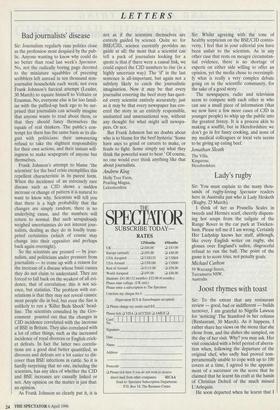LETTERS Bad journalists' disease
Sir: Journalism regularly runs politics close as the profession most despised by the pub- lic. Anyone wanting to know why could do no better than read last week's Spectator. No, not the radically boring page devoted to the miniature squabbles of preening scribblers left unread in ten thousand non- journalist households each week; not even Frank Johnson's farcical attempt (Leader, 30 March) to equate himself to Voltaire or Erasmus. No, everyone else is far too famil- iar with the puffed-up hack ego to be sur- prised that journalists can actually imagine that anyone wants to read about them, or that they should fancy themselves the equals of real thinkers. The public's con- tempt for them has the same basis as its dis- gust with politicians: their unwavering refusal to take the slightest responsibility for their own actions, and their instant will- ingness to make scapegoats of anyone but themselves.
Frank Johnson's attempt to blame `the scientists' for the beef crisis exemplifies this repellent characteristic in its purest form. When the incidence of an extremely rare disease such as CJD shows a sudden increase or change of pattern it is natural to want to know why. Scientists will tell you that there is a high probability that the changes are simply random, there is no underlying cause, and the numbers will return to normal. But such scrupulously weighed uncertainties do not interest jour- nalists, dealing as they do in loudly trum- peted certainties (which of course may change into their opposites and perhaps back again overnight).
So the scientists are pressed — by jour- nalists, and politicians under pressure from journalists — to come up with a reason for the increase of a disease whose basic causes they do not claim to understand. They are forced to fall back on the weakest of all evi- dence, that of correlation: this is not sci- ence, but statistics. The problem with cor- relations is that they may not reveal causes: most people die in bed, but even the Sun is unlikely to run a 'Killer Beds Shock' head- line. The scientists consulted by the Gov- ernment pointed out that the changes in CJD incidence correlated with the increase of BSE in Britain. They also correlated with a lot of other things, such as the increased incidence of royal divorces or English crick- et defeats. In fact the latter two correla- tions are a good deal better quantified, as divorces and defeats are a lot easier to dis- cover than BSE infections in cattle. So it is hardly surprising that no one, including the scientists, has any idea of whether the CJD and BSE increases are causally linked or not. Any opinion on the matter is just that: an opinion.
As Frank Johnson so clearly put it, it is not as if the scientists themselves are entirely guided by science. Quite so: for BSE/CJD, science currently provides no guide at all; the most that a scientist can tell a pack of journalists looking for a quote is that if there were a causal link, we could expect the CJD numbers to rise (in a highly uncertain way). The 'if' in the last sentence is all-important, but again not a subtlety likely to catch the journalistic imagination. Now it may be that every journalist covering the beef story has quot- ed every scientist entirely accurately; just as it may be that every newspaper has cov- ered the story in an entirely responsible, unslanted and unsensational way, without any thought for what might sell newspa- pers. Or not.
But Frank Johnson has no doubts about who is to blame for the beef hysteria: `Some have axes to grind or careers to make, or feuds to fight. Some simply say what they think the powerful want to hear.' Of course, no one would ever think anything like that about journalists.
Andrew King
Holly Tree Farm, Peatling Magna, Leicestershire


























































 Previous page
Previous page